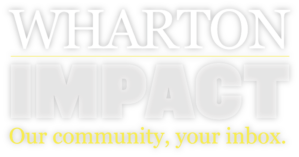January 2022 • Edition 5
In this edition, read how the School is facing the future by building on its past; learn how an MBA alumnus gives back through mentoring and advising Wharton students and graduates; and start the new year with some tips on overcoming obstacles — while having fun!
Wharton in 2022
Strong, Stronger, Strongest

Lundquist shared with Wharton Impact his joy at the School being “best in class” and his admiration that students, faculty, alumni, and staff came through the global pandemic by standing strong, together.
Time Is Treasure When It Comes to Giving

Brian Hughes, W’81, WG’91, understands the value of time. As a retired KPMG partner, Hughes knows that time is money. Yet, for him, it is his personal investment when mentoring and advising students and alumni that is his greatest reward as a member of the Wharton community.
A consistent donor to The Wharton Fund since he graduated from WEMBA, the Wharton Executive MBA Program, in 1991, Hughes “gets” the value of giving dollars and cents. But his most treasured commitment lies in interacting with entrepreneurs who are starting out in business or who are making a career change.
“The question I ask myself most is, ‘How can I help?’” Hughes said. “Real knowledge of how to help an individual is so impactful.” Hughes takes the time to know the students he interacts with as a Volunteer Expert in Residence (EIR) for Venture Lab and as a judge and advisor during (and after) the Venture Lab Startup Challenge.
“I love sharing my expertise in the startup space,” Hughes said. He serves as a consultant to startups as well as billion-dollar companies and brings that high-level knowledge to the floor when he is judging pitches at the Penn-Wharton flagship entrepreneurship event and working as an EIR.
Hughes said the world is wide open for entrepreneurs, and he feels fulfilled by providing advice and guidance to Wharton students and alumni who are making first steps or those who may be taking a well-established venture public.
“Today’s startups cover broad areas of interest, including crypto, fintech, healthtech, cybersecurity, and foodtech, to name a few,” Hughes said. “It is my reward to help future, and established, businesses develop successfully.”
Making Change Stick — for Good

Wharton Professor Katy Milkman co-directs the Behavior Change for Good Initiative at the University of Pennsylvania. At a recent virtual event to celebrate the end of Wharton’s $1 billion More Than Ever campaign, Milkman shared that it is “critically important to outsmart the obstacles to change.”
She challenged the audience to ask themselves what it is that holds them back from creating, and sustaining, change. And in her bestselling book, How to Change: The Science of Getting from Where You Are to Where You Want to Be (which the New York Times recently named as one of the top eight books of 2021 for healthy living ), she sets out key principles for solutions to overcome obstacles — and how to make change fun.
“If we want to get to a solution, we need to identify the obstacle,” Milkman said. “Turning an uphill battle into a downhill one is the key to success.”
Drawing on her original research and the work of her world-renowned scientific collaborators, Milkman laid out strategic methods for identifying and overcoming common barriers to change, such as impulsivity, procrastination, and forgetfulness.
A few of Milkman’s takeaways on how to make change happen include:
- Learning how to add the proverbial “spoonful of sugar.” We all go farther, faster when things are fun.
- Having a clean slate, which makes change more attractive. Commitment to change does not just happen on New Year’s Eve; New Year’s Eve-style moments (“fresh starts”) give a powerful feeling of “You can do it!” and arise every Monday, on every birthday, and beyond.
- Giving (solicited) advice to others as a way to help boost your confidence and improve your own outcomes when you want to change. Forming an “advice club” can help to keep up the momentum for creating enduring behavior change.




